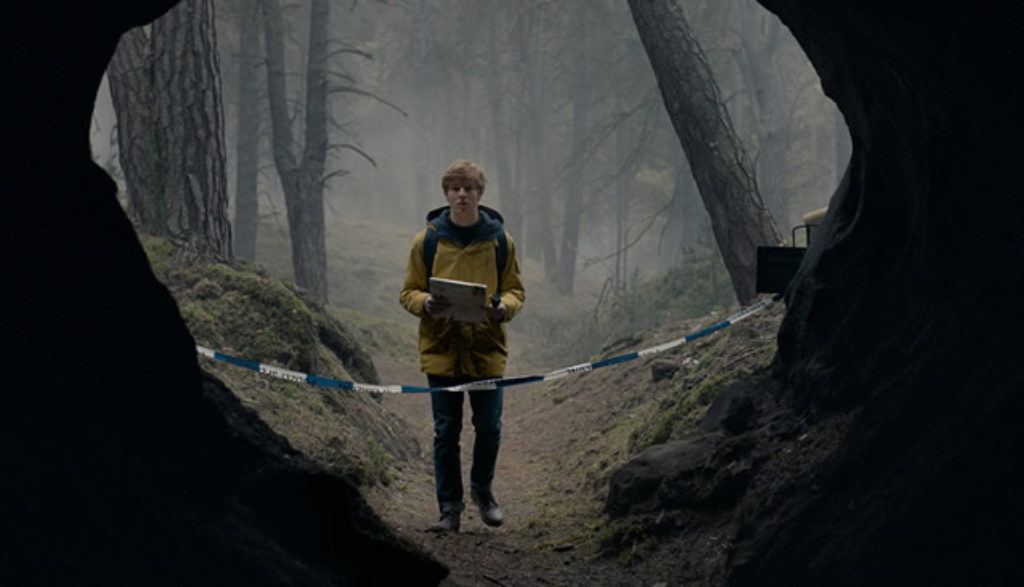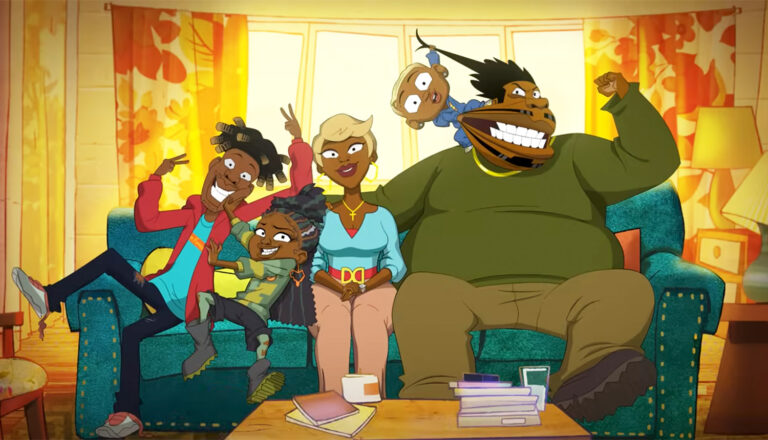
Something wicked this way comes, Shakespeare wrote in Macbeth. But in the town of Winden, Germany, it’s already here—ready to renew its acquaintance.
This series begins with a suicide, bleak and brutal, and goes on from there. Two months later, that deceased man’s teenage son, Jonas, is haunted by dreams and visions of his dead father. He pops pills and smokes marijuana to cope, and he speaks to a therapist now and then. But nothing answers the question he asks every day and night: Why did his father do it?
Jonas’ mother copes with her husband’s death in an entirely different way—first by having an affair with, and then marrying, Ulrich, the town’s police chief.
But Ulrich has trouble settling down with just one woman, it seems. Now he has an ex-wife (and the kids they had together), a pregnant second wife (that’d be Jonas’s mother) and yet another girlfriend–a fellow officer and colleague. And his on-the-job duties are getting ever more difficult.
Erik, one of Jonas’ high school chums, disappeared just two weeks before, seemingly without a trace. Ulrich says he’s never seen anything like Erik’s disappearance in Winden—but he’s lying. He knows it does happen, and knows it as well as anyone. You see, it all happened before, 33 years ago, when Ulrich was a kid himself. And perhaps 33 years before that. And when Ulrich’s own son, Mikkel, soon goes missing, too, he’s forced to reckon not only with the present, but with the town’s mysterious past as well.
In the opening moments of the first episode, a still very-much-present Mikkel performs a magic trick for his dad: Sitting at the kitchen table, he puts what looks like a little game piece under one of two shells. Then he lifts the first shell up again. Gone! Then he lifts up the second. There it is! It’s a pretty nifty trick, and Ulrich is impressed.
“How’d you do that?” Ulrich asks.
“The question isn’t how,” a smiling Mikkel says. “The question is when.”
And that, it seems, is the concept at the heart of Dark: When. Not only do people mysteriously disappear and die. Time itself in this quiet, continental hamlet is malleable, liable to jump or fold or bend with little provocation—at least so it would seem inside a mysterious cave located near an equally mysterious nuclear power plant. As a sage voice suggests from the outset, “The distinction between the past, present and future is nothing but an illusion.” At least, that’s how it is in Winden.
But if time is flexible here, the sins committed inside that time remain stubbornly influential, not easily changed nor erased. In fact, those sins seem to echo through generations, doomed to be repeated decade after decade.
Netflix has long told anyone who would listen that it wants to provide programming for everybody, and lately it’s been investing in creating stories for markets overseas. The German-language Dark (dubbed for English-speaking audiences) is one of its first attempts along these lines, while Netflix also explores how amenable American audiences—still its most lucrative piece of the pie—might be to watching such foreign-language faire.
Turns out, people here are pretty amenable, if we can trust the show’s buzz. While Netflix doesn’t consistently release its viewership numbers, Dark has certainly touched a nerve with the television press—many members of whom are comparing the show with Netflix’s runaway phenomenon Stranger Things.
But while Dark and Stranger Things share some superficial touchstones—intrepid kids trying to unfold a supernatural mystery, adults trying to save their kids, a certain fascination with the 1980s—Dark is, true to its name, far darker.
Winden may seem quiet and tranquil, as Ulrich suggests. But only in the same way a mountain lake favored by the mafia might seem peaceful: The still surface hides a surfeit of skeletons. Violence and death are everywhere. Everyone keeps secrets. Most of the town’s adults seem to be having affairs. And the teens? Well, they’ve got problems aplenty, too—and all the drink and drugs they consume can’t quite quell them.
Sure, Stranger Things has its content issues, too. But it is, at its heart, an off-kilter love letter to the 1980s. It’s a nostalgic romp through a more innocent time, albeit one populated by underworld beings that want to eat us all. Dark feels colder, and its characters seem more existentially desperate. Indeed, Dark is more vintage Twin Peaks than Stranger Things, with its surreal, haunting vibe; it’s bevy of shameful town secrets; and a thread of psychedelic madness at its core. But there’s nary a log lady or a fine cup of coffee to cut through the gloom.
The original Twin Peaks came at a time when shows had to abide by certain broadcast standards. Dark has no such constraints: Body parts are nakedly exposed. F-words fly without bleeps. Blood seeps through the screen, the stench of death practically palatable in the grim images we witness.
Those who’ve watched Dark to its conclusion praise the precision of the supernatural puzzle it presents: Like Mikkel’s shell trick, Netflix pulls off a nifty feat.
So they say.
But while I appreciate a great puzzle as much as anyone, I don’t think I could stomach the show long enough to see its core mystery resolved. The real world is dark enough without watching it on my free time.
In this Season 3 premiere, Martha, daughter of police chief Ulrich, takes Jonas back in time, to 2019, but leaves him there alone to figure out how to right the wrongs of the past.
Jonas’ hands are covered in blood as he stands over a dead young woman. A young boy drops through a wormhole, dead. A woman, seemingly dead and covered in oil, suddenly revives and chases Martha. An elderly man is suffocated by a stranger while sitting in a wheelchair.
Two teenagers have sex twice. Once, we see the young man naked from the side and the woman’s bare breasts and rear. Later, this same young woman takes off her underwear (although we don’t see any skin) and we see graphic movements and hear noises.
A husband cheats on his pregnant wife with a colleague. Martha sits on her bed in a t-shirt and underwear. Couples kiss, make out and flirt.
Police search for a missing boy. Martha’s oldest brother shares his nihilistic worldview with his friends. Teens joke about the end of the world and an apocalypse. During a high school play, Martha and her boyfriend rehearse lines dealing with the sins of the past and appropriate punishment for said sins.
The f-word is heard five times and the s-word is used nearly 10 times. Other profanity includes multiple utterances of “dumb a–” and “a–.”
High schooler Erik Obendorf has been missing for two weeks. As a group of concerned parents meet at Erik’s old high school to reiterate the importance of sharing any information they uncover, some of Erik’s high school chums go out to Erik’s old hangout spot—where they believe he kept all his marijuana. If he’s not around to use it, they might as well smoke it and sell it, right? But when they hear strange noises from a nearby cave and their flashlights start flickering, they split—accidentally leaving behind Mikkel, the kid brother of one of the teens.
A man hangs himself in the movie’s opening scene. We see him put the noose around his neck and kick a stool out from underneath his feet, then hear him struggle for breath as the camera zooms in on a letter he apparently wrote (to be read several months after his death). Later, the man’s son, Jonas, seems to see his dead-but-living father in the middle of the woods, his face covered in blood. Elsewhere, the corpse of a boy is found buried underneath a small covering of leaves: His gray face looks scorched in places. A teen, gagged, looks as if he’s about to undergo some sort of shock therapy “treatment.” Mikkel is hit on the back of the head several times by his brother and others.
Jonas’ mother and Mikkel’s father (the chief of police) are having an affair. We see them in bed together having sex in an explicit that includes nudity; her unclothed body is partially visible as they lie together afterward. They kiss, as do teens. A shirtless man receives a professional massage.
A teen smokes a joint. Another comes by, grabs it and takes a puff, too. Several adolescents discuss what they’re going to do with Erik’s unused weed. Someone drinks wine. Jonas takes meds, perhaps for depression or psychosis. Two guys crudely discuss what a young woman’s anus. One teen creates a double entendre using the word baguette. Characters say the f-word eight times, the s-word about 15 times and use other profanities too, including “a–,” “d–n” and “h—.”
Someone says the Serenity Prayer. Jonas tells his friends that his father used to say that “good and evil is a matter of perspective.”


Paul Asay has been part of the Plugged In staff since 2007, watching and reviewing roughly 15 quintillion movies and television shows. He’s written for a number of other publications, too, including Time, The Washington Post and Christianity Today. The author of several books, Paul loves to find spirituality in unexpected places, including popular entertainment, and he loves all things superhero. His vices include James Bond films, Mountain Dew and terrible B-grade movies. He’s married, has two children and a neurotic dog, runs marathons on occasion and hopes to someday own his own tuxedo. Feel free to follow him on Twitter @AsayPaul.

Kristin Smith joined the Plugged In team in 2017. Formerly a Spanish and English teacher, Kristin loves reading literature and eating authentic Mexican tacos. She and her husband, Eddy, love raising their children Judah and Selah. Kristin also has a deep affection for coffee, music, her dog (Cali) and cat (Aslan).

An elf mage contemplates on connection and regret as she watches her human friends grow old and pass away.

Netflix takes a classic sitcom, Good Times, and turns it into a vulgar, violent, sexually-charged TV-MA show.